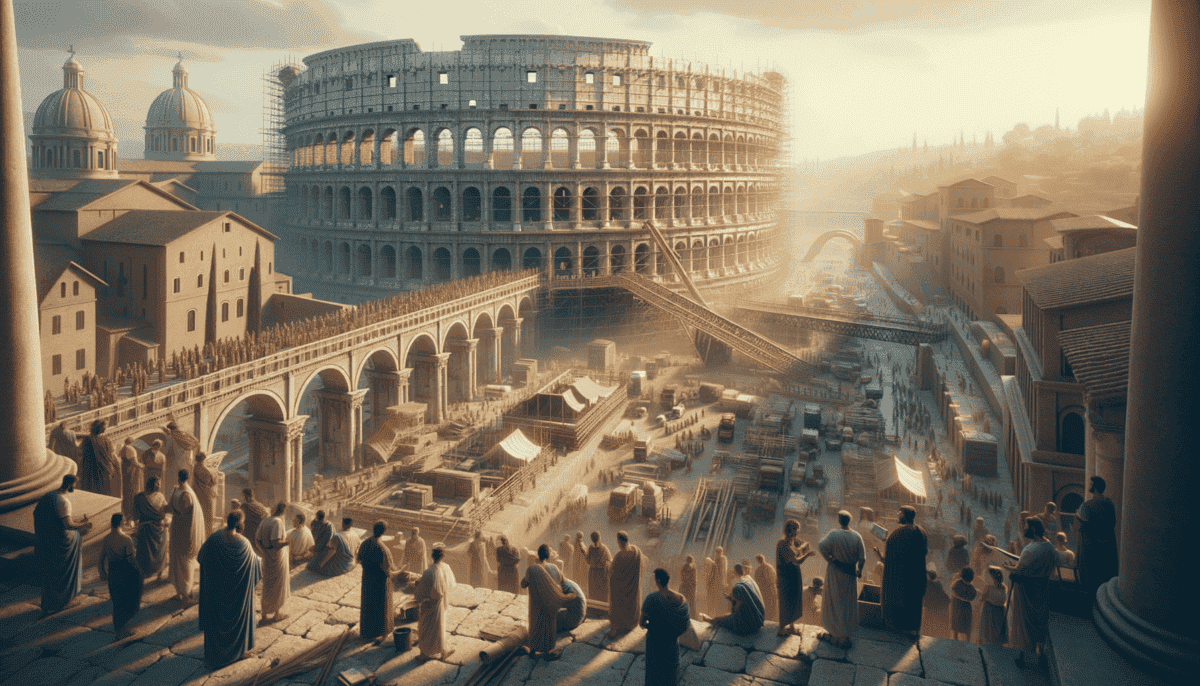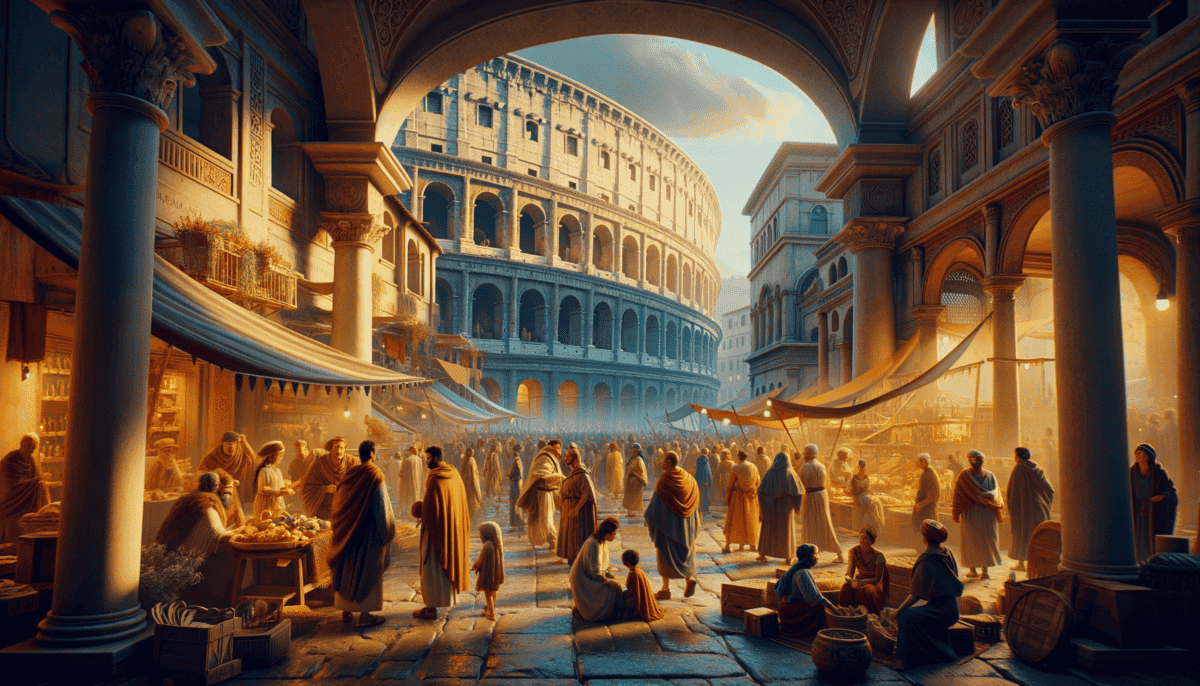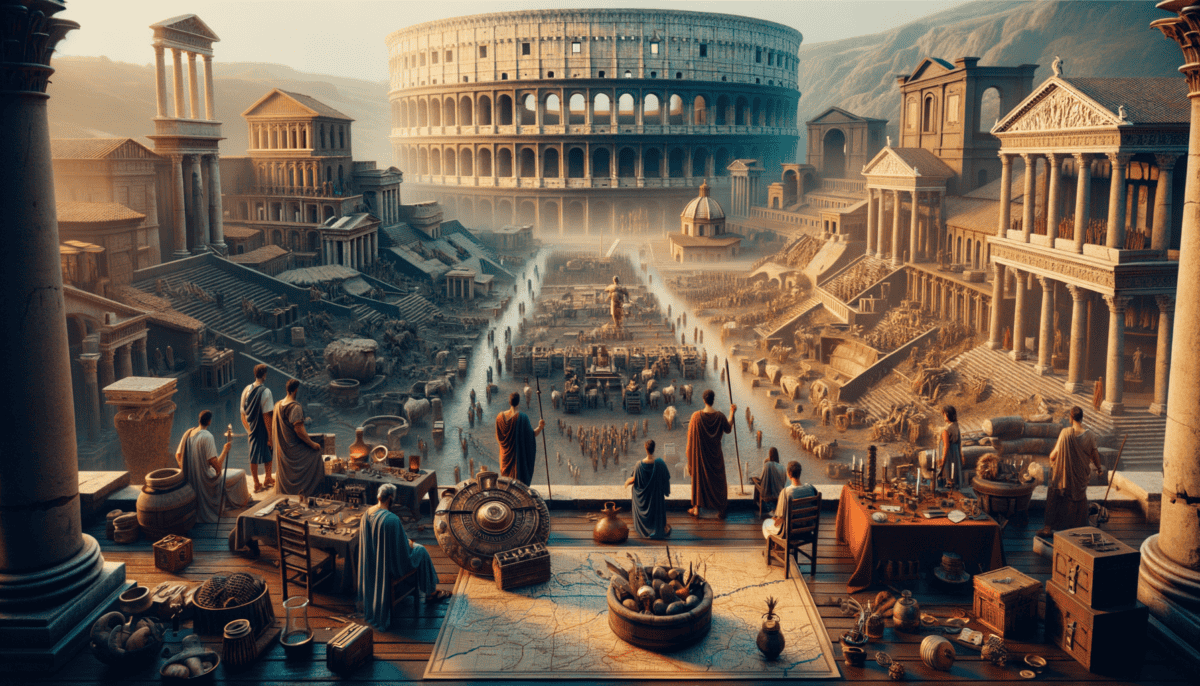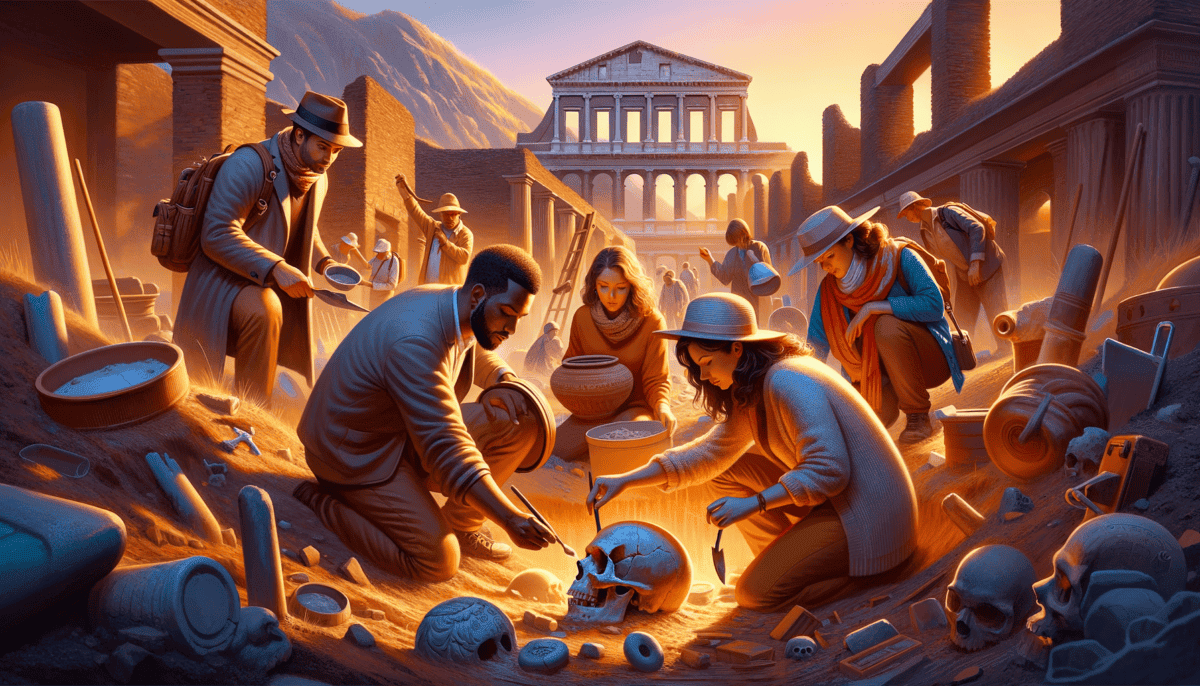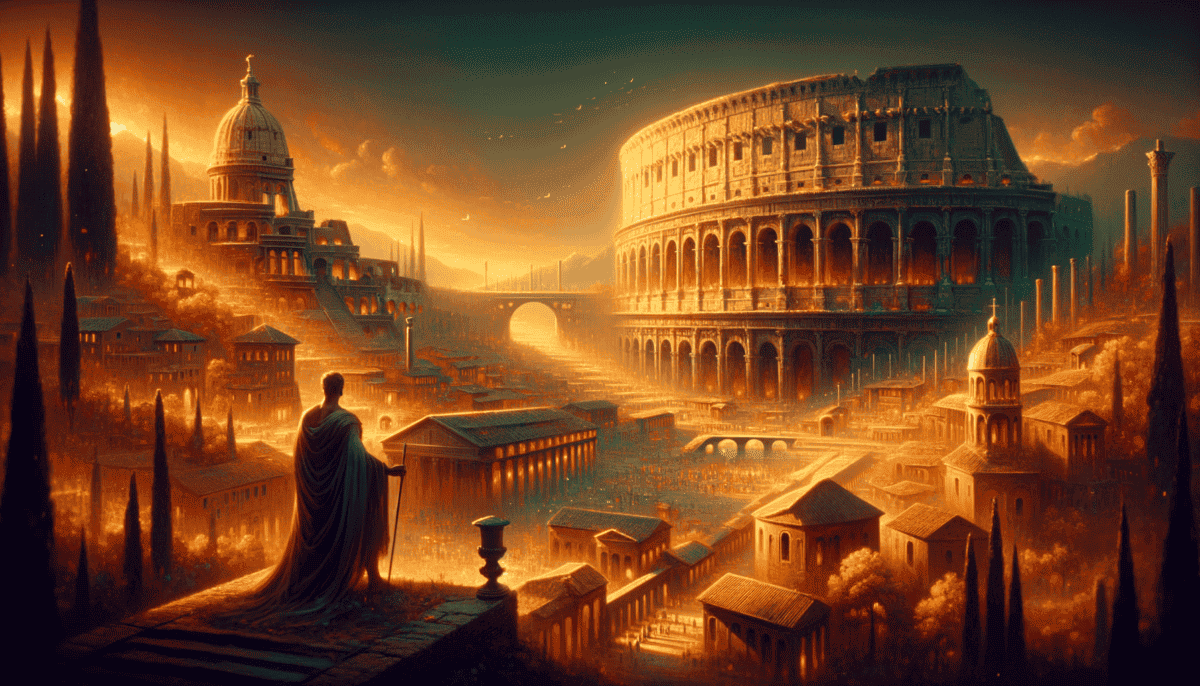The Legend Begins
Marcus stared at the ancient stone wall, his small fingers tracing the carved figures of two babies and a wolf. "Tell me the story again, Grandpa!" he begged, his eyes wide with wonder.
Grandpa Giuseppe smiled and sat down on a nearby bench. The warm Italian sun painted golden patterns through the leaves above them. "Ah, the story of how Rome began! It's quite magical, little one."
A long, long time ago, there were two special baby boys named Romulus and Remus. They were twins! But they weren’t just any babies – they were princes.
"What happened to them, Grandpa?" Marcus scooted closer, even though he'd heard the tale many times before.
"Well, you see, these babies were in danger. A mean king was scared they would grow up to take his throne. So, someone put the babies in a basket and sent them floating down the River Tiber."
Marcus gasped, just like he always did at this part. "But they didn't drown!"
“No, they didn’t! Something amazing happened. A mother wolf found them on the riverbank. Instead of hurting them, she took care of them like they were her own wolf cubs. She fed them and kept them warm and safe.”
"The babies grew into strong young men," Grandpa continued. "They decided to build their own city. But they couldn't agree on where to build it."
"And that's when the fight happened?" Marcus asked quietly.
"Yes, little one. Romulus and Remus had a big fight. Romulus won, and he built the city right here where we're sitting. He named it Roma – Rome – after himself."
The sun was starting to set now, painting the old ruins in shades of orange and pink. Marcus looked around at the ancient stones, imagining the city as it was being built so long ago.
"Is that why we have the birthday of Rome party every year?" Marcus asked, remembering the festive celebrations that filled the streets each April.
"That's right! On April 21st, we celebrate the birthday of our city. Rome is almost 2,800 years old now!"
Marcus stood up and spread his arms wide. "And now Rome is huge! With big buildings and fountains and…"
"And gelato shops!" Grandpa laughed, ruffling Marcus's hair. "But remember, even the biggest cities start small. Rome began with just a story – a story about two babies, a wolf, and a dream of building something special."
As they walked home through the ancient streets, Marcus noticed how the old stones seemed to whisper their secrets. Every corner held a piece of the story, waiting to be discovered by curious young explorers like him.
The street lamps were starting to flicker on, casting long shadows that danced across the cobblestones. Tomorrow would bring new adventures and more stories from Rome's amazing past.
Marcus looked back one last time at the stone carving of the wolf and twins. “I’m glad Romulus built his city here,” he said softly. “It’s the best city in the whole world.”
Building Dreams in Stone
The morning sun sparkled on the marble columns as Julia watched her father work. He was Rome’s best builder, and today she got to help! ️
“Papa, how do you make buildings so tall without them falling?” Julia asked, handing him his measuring tools.
“Ah, that’s the magic of Roman concrete, my dear!” her father smiled. “It’s like making a cake – but instead of flour and eggs, we mix lime, volcanic ash, and water.”
Julia watched as workers poured the thick mixture into wooden frames. “Look how it hardens, Papa! Just like magic!”
“Not magic, clever thinking! Our Roman builders figured out that adding volcanic ash makes the concrete super strong. It even works underwater!”
At the construction site, huge stone arches rose into the sky. Julia learned that arches were like rainbow shapes made of stone. They helped hold up heavy roofs and walls.
“Can we visit the aqueduct today?” Julia bounced excitedly. The giant water bridges were her favorite Roman invention.
“Of course! But first, let me show you something special we’re building.”
Papa led Julia to a huge round building site. Workers were everywhere, lifting stones and measuring angles.
“See those clever lifts?” Papa pointed to wooden machines with ropes and pulleys. “They help us lift heavy stones high up. Like having giant hands!” ️
Julia watched in wonder as a massive stone block floated up into the air. “How do you know where everything goes?”
“We make careful plans first,” Papa explained, showing her drawings on papyrus. “Like a map for building. Every stone has its special place.”
Later that day, they walked along the mighty aqueduct. Water flowed through channels high above their heads, bringing fresh water to Rome from the mountains.
“The water flows downhill very slowly,” Papa explained. “Just a tiny bit downward over a long distance. That’s how we get water to flow without pumps!”
“Like a very long slide?” Julia giggled.
“Exactly! You’re thinking like a Roman builder already!”
On their way home, they passed the public baths. Hot steam rose from the buildings where Romans went to get clean and meet friends.
“How do they keep the water hot, Papa?”
“We build special floors with spaces underneath. We light fires there, and the heat rises through the floors and walls. It’s like having a blanket wrapped around the whole building!”
As the sun set, Julia looked back at the city. Everywhere she looked, there were amazing buildings reaching to the sky.
“When I grow up,” she declared, “I want to build amazing things too!”
Papa squeezed her hand. “You already are, my dear. Every time you learn something new about building, you’re helping build Rome’s future.”
The stars began to twinkle above the city’s domes and towers. Tomorrow would bring new projects and more chances to learn the secrets of Rome’s amazing builders.
A Day in Ancient Rome
The sun was barely peeking over the hills when Marcus woke up to the smell of fresh bread. In his apartment building called an insula, families were already starting their day.
“Wake up, sleepyhead!” his mother called. “The market won’t wait for late shoppers!”
Marcus loved market days. The streets of Rome were always full of exciting sights, sounds, and smells. He could hear the clip-clop of cart wheels on stone streets below his window.
At the market, people from all over the Roman Empire sold their goods. Marcus saw:
- Spices from Egypt ️
- Silk from China
- Olive oil from Spain
- Glass from Syria
- Fish from the Mediterranean Sea
“Look, Marcus!” his friend Claudia waved from her family’s fruit stand. “We got sweet figs from Africa today!”
The marketplace was like a rainbow of colors and faces. People spoke many different languages. Some wore togas, others had bright clothing from far-away lands.
Near the fountain, a teacher was giving lessons to rich children. Poor children like Marcus learned by helping their parents work.
“One day,” Marcus whispered to himself, “I’ll learn to read too.”
At noon, the public bread distribution began. Poor citizens lined up to get their free bread. This was how Rome made sure everyone had food to eat.
“Marcus!” called Mr. Felix, the baker. “Would you deliver these loaves to Senator Quintus? I’ll give you a sweet bun as payment!”
Marcus ran through the busy streets, careful not to bump into anyone. He passed:
– Street vendors selling hot soup
– Children playing with wooden toys
– Women getting water from fountains
– Men in togas heading to business meetings
At the senator’s grand house, Marcus saw beautiful mosaics on the floors and colorful paintings on the walls. The senator’s daughter, Julia, was practicing her writing.
“Would you like to learn a letter?” Julia asked kindly, seeing Marcus stare at her wax tablet.
She showed him how to write ‘M’ for Marcus. It was his first time writing anything!
On his way home, Marcus stopped at the public baths with his father. Rich and poor Romans bathed together here. They talked about city news and played games.
As evening fell, oil lamps began to glow in windows. The smell of dinner cooking filled the air. Marcus helped his mother make barley porridge and fish stew.
“Tell me about your day,” his mother smiled, stirring the pot.
Marcus touched the ‘M’ he had drawn on a piece of broken pottery. “Today,” he grinned, “I started learning to write like a proper Roman!”
Outside their window, the great city hummed with life. In apartments and grand houses, poor folks and rich ones, people from near and far – they were all part of Rome’s amazing story.
Armies of Empire
The morning trumpet blared across the Roman camp, waking young Lucius from his dreams. As a new soldier in the mighty Roman army, he was learning what it meant to defend the empire.
“Line up for training!” Commander Flavius shouted. His voice was strong like thunder. “Today we learn how to work as one team!”
Lucius stood next to his friend Hadrian, who came from far-away Britain. They wore matching red tunics and shiny armor. Their shields gleamed in the morning sun. ⚔️
“My father says Roman soldiers are the bravest in the world,” Hadrian whispered. “We protect people and bring peace.”
The soldiers practiced moving together like a giant turtle. They held their shields up to make a strong wall. This special move was called the testudo formation.
Commander Flavius taught them important things Roman soldiers must do:
- Build strong roads and bridges ️
- Help people in towns they protect ️
- Learn the languages of different lands ️
- Share Roman ideas with new friends
- Keep peace in faraway places ✌️
After lunch, a messenger arrived with exciting news. “We’re going on a special mission!” announced Commander Flavius. “We’ll help build a new city in Gaul!”
As they marched toward Gaul, Lucius saw amazing things. There were forests bigger than Rome, mountains that touched the clouds, and rivers wider than any he’d seen before.
“Look!” Hadrian pointed to people working in fields. “They’re growing wheat like in my homeland!”
The local people welcomed the Romans with gifts of food and friendship. An old man approached Lucius:
“Will you teach us to build strong stone houses like yours?” he asked hopefully.
Lucius smiled and nodded. He remembered what his commander always said: “A true Roman soldier builds bridges between peoples.”
The next day, they began building. Roman soldiers showed local people how to make roads and buildings. The local people taught the Romans about plants that could heal wounds.
A young local boy watched Lucius work. “Can I be a Roman soldier too?” he asked.
“Of course!” Lucius replied. “Rome welcomes brave people from everywhere!”
As the sun set, Lucius wrote in his diary: “Today I learned that being a Roman soldier means more than fighting. It means building, teaching, and making new friends across the empire.” ✍️
In his tent that night, Lucius dreamed of all the amazing places he would see and the people he would meet as a Roman soldier. The empire was growing, not just bigger, but better – one friendship at a time.
Hidden Wonders
The sun was just peeking over the hills when Maria spotted something unusual in the dirt. As a young archaeologist working in Rome, every day brought new surprises.
“Professor Santos, come quick!” Maria called out excitedly. “I think I found something!” Her small brush gently swept away centuries of dirt.
The professor hurried over, his eyes widening. “Careful now,” he whispered. “This could be very special.”
“It looks like… a tiny house?” Maria wondered aloud.
As they cleaned more dirt away, they found a beautiful little bronze statue of a Roman home. It was perfect, right down to its tiny windows and doors. ✨
Their team had found many amazing things this week:
- Colorful wall paintings
- Old Roman coins
- Clay pots for cooking
- Children’s toys from long ago
- Beautiful jewelry
Later that day, they visited the famous buried city of Pompeii. The streets were frozen in time, covered by ash from a giant volcano long ago.
“Look at these footprints!” said Tommy, the team’s youngest helper. “Someone walked here two thousand years ago!”
In one house, they found a table still set for dinner. There were plates, cups, and even the remains of ancient bread. It was like the family had just stepped away for a moment.
“It’s like a photograph of a single day in Roman times,” Professor Santos explained. “Everything stopped at once when the volcano erupted.”
In the afternoon, Maria made another exciting find. “A writing tablet!” she exclaimed. “And I can still see the words!”
The ancient message said: “Remember to buy bread from Marcus the baker. His is the best in Pompeii!”
As the sun set, the team carefully packed up their finds. Each object would go to a museum where people could learn from it.
Maria wrote in her notebook: “Today we didn’t just find old things. We found stories of real people who lived long ago. Their city may be buried, but their stories live on.” ✍️
That night, as stars twinkled above the ancient ruins, Maria imagined all the other treasures still waiting to be found. Tomorrow might bring another amazing discovery from the world of ancient Rome.
Rome’s Eternal Story
Maria sat in the new Museum of Roman Discoveries, looking at the little bronze house they had found. Hundreds of people came each day to see their amazing finds. ️
“Do you know what I love most about Rome?” Professor Santos asked, sitting next to her. “Even after 2,000 years, we can still feel its magic everywhere.” ✨
He pointed out the window at the modern city. “Look at our buildings today. Many have columns just like Roman temples. Our roads follow the same paths Romans built.” ️
“The Romans gave us so many good ideas,” Maria smiled. “Like running water in our homes and big sports stadiums!”
Tommy rushed in with exciting news. “They found another Roman ship in the harbor! It’s full of clay pots and beautiful glass!”
Maria thought about all the ways Rome still touches our lives:
- Our laws and governments
- The words we use
- How we build roads and bridges
- The way we tell time and use calendars
- Many of our favorite foods
That afternoon, a school class visited the museum. The children’s eyes grew wide at the ancient treasures.
“Were Roman kids like us?” a little girl asked.
“Very much like you!” Maria answered. “They played games, went to school, and helped their families – just like you do!”
Later, Professor Santos gathered everyone around a new display. “Rome’s greatest gift wasn’t its buildings or roads,” he said. “It was showing us that people can do amazing things when they work together.”
As the sun set over Rome’s ancient hills, Maria walked through the modern city. She passed the mighty Colosseum, still standing after all these years. New buildings rose next to ancient ruins.
She thought about the little bronze house in the museum. Somewhere, long ago, a Roman artist made it with care and pride. Now it helped tell Rome’s story to a whole new world.
“The story of Rome isn’t over,” Maria wrote in her journal that night. “It lives in every new discovery we make, every ancient stone we uncover, and every lesson we learn from the past.” ✍️
Tommy peeked at her writing. “Do you think people will study our cities in 2,000 years?”
Maria smiled. “They might! That’s why we must build wonderful things too. We’re part of the same big story that started with Rome.” ⭐
As stars appeared over the Eternal City, Maria knew that tomorrow would bring new discoveries. The greatest treasure of Rome wasn’t gold or marble – it was the dream of building something that would last forever.


